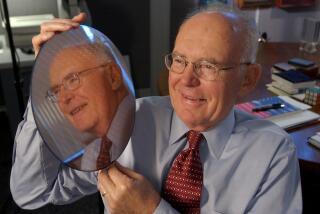Judge in Microchip Copyright Case Quits Over Stock Question
- Share via
SAN JOSE — A judge who issued a landmark ruling that the internal design of microchips is protected by U.S. copyright law has removed himself from the case, apparently because he owns $80 worth of stock.
The move by U.S. District Judge William A. Ingram to quit the legal battle between Intel Corp. of Santa Clara, Calif., and NEC Corp. of Japan means that the two sides will have to start the case again from the beginning. It began in 1984.
“It’s back to square one,” said Linnet Harlan, a counsel at NEC Electronics Inc., NEC’s Mountain View, Calif.-based subsidiary.
Ingram’s move, which could delay another decision for years, surprised and disappointed many Silicon Valley semiconductor companies, which saw his ruling as an important precedent for the U.S. electronics industry.
Code Ruling Awaited
Ingram ruled on Sept. 23, 1986, that microcode--the circuitry in a chip that translates commands into language recognized by the microprocessor’s hardware--could be copyrighted like books, music or computer software.
Some chip makers said at the time that the ruling could encourage the development of new, more advanced products, since companies would be less worried that a competitor might simply copy the code without spending the time and money to develop it.
Others said that such protection would create a virtual monopoly for Intel and other companies that are first to the market with a chip.
Ingram had not yet ruled on another important issue in the case: whether NEC illegally copied the code that Intel uses to run its microprocessors.
Mulled by Appeals Court
Intel sued NEC, alleging that the Japanese company’s V20 and V30 microprocessors illegally reproduce the microcode of Intel’s 8086 and 8088 chips, widely used in IBM and IBM-compatible PCs.
NEC had a license to make the Intel chips, and then started producing its own IBM-compatible series, which the Japanese company said it had developed on its own.
Ingram did not detail his reasons for quitting the case in court documents filed last week. But several lawyers close to the case believe that he pulled out because of a conflict-of-interest charge levied by NEC last year. NEC had complained that Ingram indirectly owned about $80 worth of Intel stock as an officer of a private investment club.
Federal law requires disqualification of judges who have even a small financial interest in a case. The case has been stalled ever since, as lawyers for both sides filed motions to determine whether Ingram could stay on.






